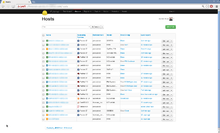Foreman (software)
 | |
|
Foreman v1.2 Screenshot Hosts | |
| Original author(s) | Paul Kelly and Ohad Levy |
|---|---|
| Initial release | 10 September 2009[1] |
| Written in | Ruby and JavaScript |
| Platform | Cross-platform: Unix, Linux, Microsoft Windows, OS X |
| Available in | English, French, German, Spanish |
| Type | Systems management |
| License | GPL |
| Website |
www |
Foreman (also known as The Foreman) is an open source complete life cycle systems management tool for provisioning, configuring and monitoring of physical and virtual servers. Foreman has deep integration to configuration management software, with Puppet, Chef, Salt and other solutions through plugins, which allows you to automate repetitive tasks, deploy applications and manage change to deployed servers.
Foreman provides provisioning on bare-metal (through managed DHCP, DNS, TFTP, and PXE-based unattended installations), virtualization and cloud. Foreman provides comprehensive, auditable interaction facilities including a web frontend, a command line interface, and a robust REST API.
History
Initial development on Foreman started on July 2009 under a different project name. The initial release 0.1 was committed in September 2009[1] by Ohad Levy.
Availability
Foreman is targeted on Linux operating systems, but users reported successful installations on Microsoft Windows, BSD, and Mac OS.
The core Foreman team maintains repositories for Linux distributions: Fedora, Red Hat Enterprise Linux (and derivatives such as CentOS), Debian and Ubuntu.
Plugins
Foreman comes with freely available plugins to increase functionality. All plugins are available on github.
Community
Foreman is built and maintained by volunteers. There are 260 IRC users on #theforeman, 60 IRC developers on #theforeman-dev, more than 213 code contributors and more than 15 translators. Those who are willing to give back to the community can contribute by code writing (Ruby on rails), user support, issue triage or design/user interface. ,
Release history
| Date | Version | Changes and additions |
|---|---|---|
| October 14, 2013 | 1.3.0[2] | Improvements were made in the installation process, API, scalability (for importing reports and facts see below), existing hosts mapping to compute resources, and more. A new official CLI. |
| January 30, 2014 | 1.4.0[3] | New compute profiles feature, improved plugin registration and web UI extensibility, Kerberos authentication support and new smart proxy features. |
| May 9, 2014 | 1.5.0[4] | Config groups feature for Puppet management, integration with FreeIPA, improved authorization system and image provisioning on oVirt, libvirt and VMware ESX. |
| September 11, 2014 | 1.6.0[5] | Plugin support for Foreman's Smart Proxy, new API version, support for LDAP or Kerberos groups. |
| December 2, 2014 | 1.7.0[6] | New features for Foreman's smart class matchers supplying data to Puppet, more advanced networking support and a build health checker. |
| April 28, 2015 | 1.8.0[7] | Networking user interface and improved provisioning support, new installer features and performance enhancements. |
| August 18, 2015 | 1.9.0[8] | User interface enhancements, improved logging, image provisioning and e-mail notifications. |
| December 23, 2015 | 1.10.0[9] | Various host management user interface enhancements, DNS plugin support in Foreman's Smart Proxy. |
See also
References
- 1 2 "Initial tag in git".
- ↑ . Groups.google.com. Retrieved on 2013-10-14.
- ↑ . Groups.google.com. Retrieved on 2014-01-30.
- ↑ . Groups.google.com. Retrieved on 2014-01-30.
- ↑ . Groups.google.com. Retrieved on 2014-09-11.
- ↑ . Groups.google.com. Retrieved on 2014-12-02.
- ↑ . Groups.google.com. Retrieved on 2015-04-28.
- ↑ . Groups.google.com. Retrieved on 2015-08-18.
- ↑ . Groups.google.com. Retrieved on 2015-12-23.
External links
| ||||||||||||||||||||||||||||||||||||||
